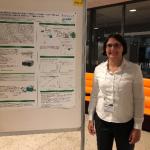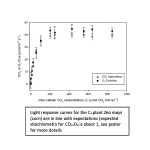As the research and development of renewable energy sources increases in momentum, it was great to have the opportunity to participate in the First European Photosynthesis Congress held at the Swedish University of Agricultural Sciences in Uppsala, Sweden.
Picarro has been involved with high precision measurements of greenhouse gas processes for several years, especially measuring CO2, CH4 and N2O from ambient air, emissions and fluxes from tundra, lakes, soils, forest canopies and other ecosystems. In more recent times we have branched out into air quality species such as formaldehyde, ammonia, hydrogen sulphide and hydrogen chloride. However, this Congress gave us the opportunity to present some exciting work in photosynthesis that we have been engaged in with our colleagues at Licor. The goal was to make simultaneous measurements of O2 exchange, CO2 exchange and chlorophyll fluorescence within a leaf chamber which can provide unique information regarding leaf biochemistry. Significant challenges occur when measuring small changes in O2 and Picarro’s CRDS technology is uniquely suited to address and overcome these issues. The inability to accurately measure these changes can result in larger errors in the O2 fluxes relative to the CO2 fluxes.
During the "Improving Crops" poster session, I presented information on the coupling between the Licor LI-6800 portable photosynthesis system and the Picarro G2207-i O2 analyzer. Interfacing the two devices allows you to monitor with highest precision the oxygen evolution during photosynthesis which contains additional information to the CO2 uptake rate.
Overall, the experiment proved that Picarro’s high precision O2 measurements can be successfully combined with the CO2 and chlorophyll fluorescence measurements yielding data that is, in all cases, in agreement with theoretical expectations in the absence of photorespiration and with results from previous work using isotopic techniques to measure O2 exchange. There are many details to consider in system plumbing, dealing with dilution by foreign gases and expected uncertainty in the O2 flux measurements relative to CO2 flux uncertainty. You can download a copy of our work here and read more information about the experimental set-up and methodology, including flow diagrams. If you are interested in similar work, contact us, we can help you with further information. We are aware of another great poster using the same G2207-i analyzer on a larger scale, ‘Measuring oxygen to unravel the forest carbon balance’, Broekema et al, presented at ICDC, 2017. You can find a copy of that work here.



